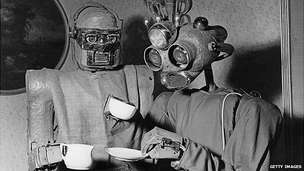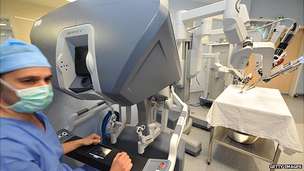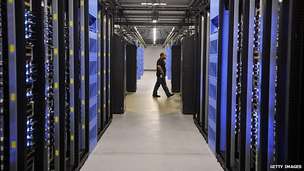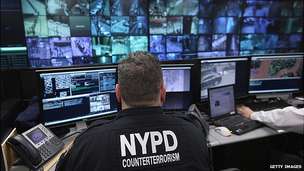
Imagine our world later in this century, when machines have got better.
Cars and trucks drive themselves, and there's hardly ever an accident. Robots root through the earth for raw materials, and miners are never trapped. Robotic surgeons rarely make errors.
Clothes are always brand new designs that day, and always fit perfectly, because your home fabricator makes them out of recycled clothes from the previous day. There is no laundry.
I can't tell you which of these technologies will start to work in this century for sure, and which will be derailed by glitches, but at least some of these things will come about.

Who will earn wealth? If robotic surgeons get really good, will tomorrow's surgeons be in the same boat as today's musicians?
Will they live gig to gig, with a token few of them winning a YouTube hit or Kickstarter success while most still have to live with their parents?
This question has to be asked. Something seems terribly askew about how technology is benefitting the world lately.
How could it be that since the incredible efficiencies of digital networking have finally reached vast numbers of people that we aren't seeing a broad benefit?

How could it be that so far the network age seems to be a time of endless austerity, jobless recoveries, loss of social mobility, and intense wealth concentration in markets that are anaemic overall?
The medicine of our time is purported to be open information. The medicine comes in many bottles: open software, free online education, European pirate parties, Wikileaks, social media, and endless variations of the above.
The principle of making information free seems, at first glance, to spread the power of information out of elite bubbles to benefit everyone.
Unfortunately, although no one realised it beforehand, the medicine turns out to be poison.
Digitally unequal
While people are created equal, computers are not.
When people share information freely, those who own the best computers benefit in extreme ways that are denied to everyone else.
Those with the best computers can simply calculate wealth and power away from ordinary people.
It doesn't matter if the best computers run schemes called high frequency trading firms, social media sites, national intelligence agencies, giant online stores, big political campaigns, insurance companies, or search engines.
Leave the semantics aside and they're all remarkably similar.
All the computers that crunch "big data" are physically similar. They are placed in obscure sites and are guarded like oilfields.
The programs that the best computers are running are also similar. First comes the gathering of freely offered information from everyone else in the world.
This might include scanned emails or social media sharing, sightings through cloud-connected cameras, or commercial and medical dossiers; there's no boundary to the snooping.
In order to lure people into asymmetrical information relationships, some treat is often dangled.

The treat might be free internet services or music, or insanely easy-to-get mortgages. The targeted audience eventually pays for these treats through lost opportunities.
Career options will eventually narrow, or credit will become insanely tight.
Ordinary people, or more precisely people with only ordinary computers, are the sole providers of the information that makes the big computers so powerful and valuable.
And ordinary people do get a certain flavour of benefit for providing that value.
They get the benefits of an informal economy usually associated with the developing world, like reputation and access to barter. The formal benefits concentrate around the biggest computers.
More and more ordinary people are thrust into a winner-takes-all economy. Social media sharers can make all the noise they want, but they forfeit the real wealth and clout needed to be politically powerful.
Do no evil
In most cases there was no evil plot. Many of the people who own the top computers are genuinely nice.
I helped create the system, and benefit from it. But nonetheless, it is not sustainable.
The core problem starts with philosophy. The owners of the biggest computers like to think about them as big artificial brains. But actually they are simply repackaging valuable information gathered from everyone else.
This is what "big data" means.
For instance, a big remote Google or Microsoft computer can translate this piece, more or less, from English to another language. But what is really going on is that real translations, made by humans, are gathered in multitudes, and pattern-matched against new texts like this one.
A mash-up of old translations will approximate the new translation that is needed, so long as there are many old translations to serve as sources. Real human translators are being made anonymous, invisible, and insecure.
As long as we keep doing things the way we are, every big computer will hide a crowd of disenfranchised people.
As it happens, the very first conception of digital networked communication foresaw a way out of this trap. I am referring to Ted Nelson's early work, dating back to 1960.
The first idea of networked digital media included a universal micropayment system, so that people would be paid when data they added to a network was used by someone else.
This idea is anathema to the current orthodoxy. If you are bristling, please give what I'm saying a chance.
Just because things have a cost, that does not mean they can't be affordable. To demand that things be free is to embrace an eternal place for poverty. The problem is not cost, but poverty.
Monetising information will bring benefits that far outweigh the inconvenience of having to adjust one's worldview.
Consider the problem of creepiness. Creepiness is when you don't have enough influence on your information life.

Government cameras track you as you walk around town, despite wars having been fought to limit the abilities of governments to do that.
Aside from governments, every other owner of a big computer is doing exactly the same thing. Private cameras track you as often as government ones.
Privacy regulations attempt to keep up, but face dismal odds. Does anyone believe such regulations have a chance?
But what if you were owed money for the use of information that exists because you exist? This is what accountants and lawyers are for.
The government should not be able to spy on you for free any more than the police should get free guns or cars. Budgets create moderation.
If the biggest computers had to pay for information, they wouldn't cease to exist.
Instead big computers would have to earn their way by providing new kinds of value. Spying and manipulating would no longer be business plans, because the raw materials would no longer be free.
In fact, the owners of the biggest computers would do fine in a world of monetised information, because that would be a world with a growing economy.
In a world of free information, the economy will start to shrink as automation rises radically. This is because in an ultra-automated economy, there won't be much to trade other than information.
But this is the most important thing: a monetised information economy will create a strong middle class out of information sharing - and a strong middle class must be able to outspend the elite of an economy for democracy to endure.
While the open information ideal feels empowering, it is actually enriching those with the biggest computers to such an extreme that it is gradually weakening democracy.
Jaron Lanier is a renowned designer, engineer, inventor, musician and author. He coined the term virtual reality and created the world's first immersive avatars. The Encyclopaedia Britannica lists him as one of the 300 greatest inventors in history. His latest book is called Who owns the future?
Взято отсюдаСледующая статья: [ Русскоязычных американцев сняли с авиарейса за разговоры на родном языке ]